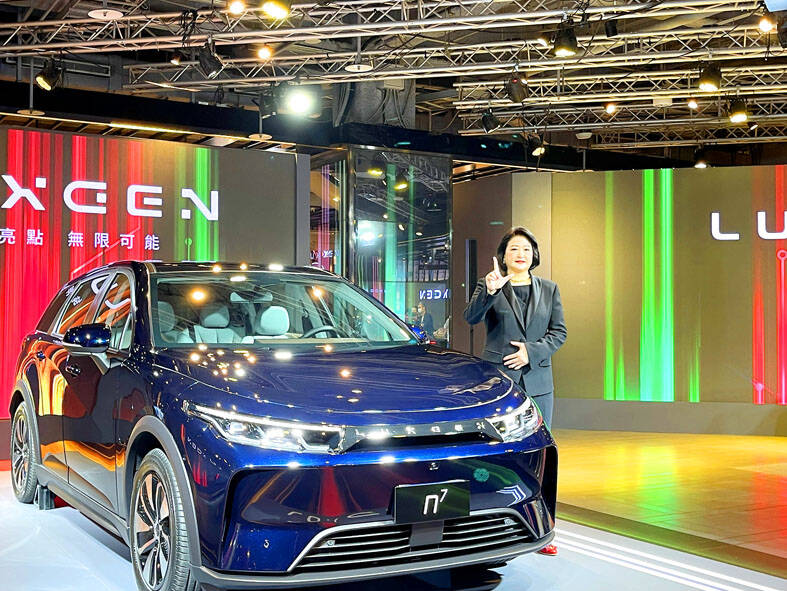Luxgen Motor Co (納智捷汽車), a subsidiary of Taiwan-based auto conglomerate Yulon Motor Co (裕隆), has received about 25,000 preorders for its n7 electric vehicle model, a Yulon executive said recently as he looked ahead to the vehicle market’s future.
Luxgen received 15,000 orders for its n7 sport utility vehicle 32 hours into the preorder period that began in September, and Yulon Motor Co vice president Li Chien-hui (李建輝) said that number has risen to about 25,000 since then.
He said the sport utility vehicle still needed time to be tested for safety and that production is not expected to begin until the fourth quarter of next year.

Photo: CNA
Shipments to fulfill the orders for 25,000 vehicles would begin that same quarter and continue into the first quarter of 2024, Li said.
The n7 model, which carries a price tag of about NT$1 million (US$32,082), is built based on the Model C prototype developed and unveiled by Hon Hai Precision Industry Co (鴻海精密) last year.
Yulon Motor has built close business ties with Hon Hai in electric vehicle development through the MIH Consortium led by the Taiwanese tech giant.
While upbeat about the future of Luxgen’s electric vehicle, Lee was cautious about the domestic auto market’s near-term prospects after having stagnated for much of this year.
He said the uncertainty caused by high inflation and subsequent increases in interest rates around the world has hurt demand, while the supply of automotive chips remained tight, limiting vehicle shipments.
In the first 10 months of this year, 337,000 vehicles were sold in Taiwan, down 5.6 percent from a year earlier.
Lee forecast that vehicle sales would reach about 420,000 units for the full year, down from 449,854 units last year, which was already 1.7 percent lower than in 2020.
To develop alternative sources of revenue, Yulon has moved into the commercial property market and is developing a shopping center in New Taipei City’s Sindian District (新店) that is scheduled to start operations in the third quarter of next year.
Sitting on 43,000 ping (142,149m2) of land, the shopping mall would house prominent tenants such as Eslite (誠品) bookstore chain and a Vieshow Cinema (威秀影城) branch, Lee said.
In the first nine months of this year, Yulon posted a loss per share of NT$1.98, compared with earnings per share of NT$3.49 during the same period last year, due to massive payouts on COVID-19 insurance policies sold by subsidiary Tokio Marine Newa Insurance Co (新安東京海上產物保險).
Excluding the losses from its insurance business, Yulon posted earnings per share of almost NT$4.9 over the nine-month period.

SEMICONDUCTORS: The German laser and plasma generator company will expand its local services as its specialized offerings support Taiwan’s semiconductor industries Trumpf SE + Co KG, a global leader in supplying laser technology and plasma generators used in chip production, is expanding its investments in Taiwan in an effort to deeply integrate into the global semiconductor supply chain in the pursuit of growth. The company, headquartered in Ditzingen, Germany, has invested significantly in a newly inaugurated regional technical center for plasma generators in Taoyuan, its latest expansion in Taiwan after being engaged in various industries for more than 25 years. The center, the first of its kind Trumpf built outside Germany, aims to serve customers from Taiwan, Japan, Southeast Asia and South Korea,

Gasoline and diesel prices at domestic fuel stations are to fall NT$0.2 per liter this week, down for a second consecutive week, CPC Corp, Taiwan (台灣中油) and Formosa Petrochemical Corp (台塑石化) announced yesterday. Effective today, gasoline prices at CPC and Formosa stations are to drop to NT$26.4, NT$27.9 and NT$29.9 per liter for 92, 95 and 98-octane unleaded gasoline respectively, the companies said in separate statements. The price of premium diesel is to fall to NT$24.8 per liter at CPC stations and NT$24.6 at Formosa pumps, they said. The price adjustments came even as international crude oil prices rose last week, as traders

SIZE MATTERS: TSMC started phasing out 8-inch wafer production last year, while Samsung is more aggressively retiring 8-inch capacity, TrendForce said Chipmakers are expected to raise prices of 8-inch wafers by up to 20 percent this year on concern over supply constraints as major contract chipmakers Taiwan Semiconductor Manufacturing Co (TSMC, 台積電) and Samsung Electronics Co gradually retire less advanced wafer capacity, TrendForce Corp (集邦科技) said yesterday. It is the first significant across-the-board price hike since a global semiconductor correction in 2023, the Taipei-based market researcher said in a report. Global 8-inch wafer capacity slid 0.3 percent year-on-year last year, although 8-inch wafer prices still hovered at relatively stable levels throughout the year, TrendForce said. The downward trend is expected to continue this year,

Taiwan Semiconductor Manufacturing Co (TSMC, 台積電), which supplies advanced chips to Nvidia Corp and Apple Inc, yesterday reported NT$1.046 trillion (US$33.1 billion) in revenue for last quarter, driven by constantly strong demand for artificial intelligence (AI) chips, falling in the upper end of its forecast. Based on TSMC’s financial guidance, revenue would expand about 22 percent sequentially to the range from US$32.2 billion to US$33.4 billion during the final quarter of 2024, it told investors in October last year. Last year in total, revenue jumped 31.61 percent to NT$3.81 trillion, compared with NT$2.89 trillion generated in the year before, according to